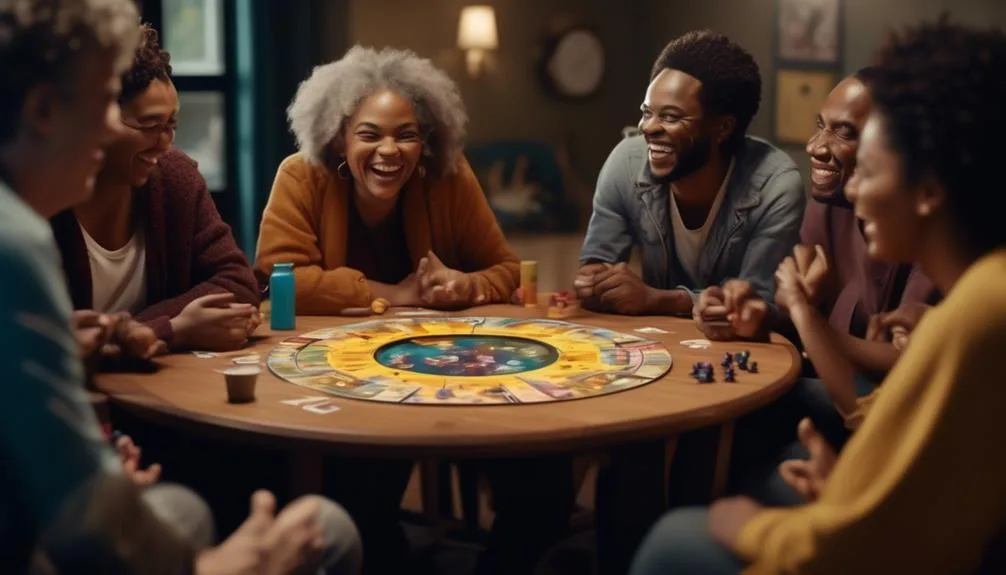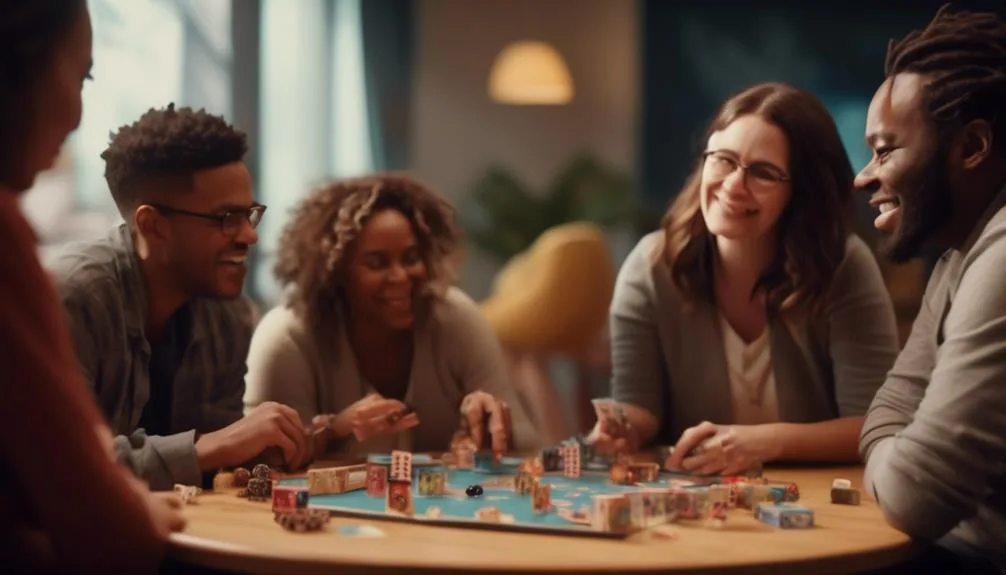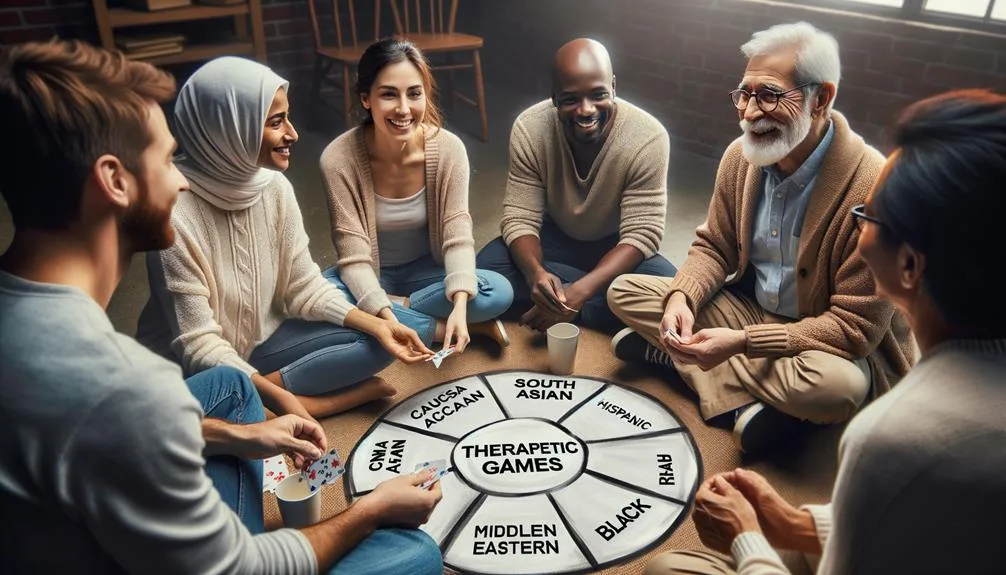Picture this: a world where healing becomes a game, where the power of play unlocks a path to growth and transformation. Therapy games offer exactly that – a unique approach to therapy that taps into the innate human desire for fun and engagement.
But what exactly are therapy games? How do they work? And most importantly, how can they help you or your loved ones on the journey to healing and self-discovery?
Get ready to step into a world of play and possibility, where the therapeutic potential of games awaits.
Key Takeaways
- Therapy games are beneficial for both adults and children, as they help build engagement, relax individuals, and teach social and cognitive skills.
- Games can be tailored to the specific needs and goals of different therapy sessions, whether it's for toddlers, group sessions, family/couples therapy, occupational therapy, or video game therapy.
- Board games offer a tangible and interactive therapeutic experience, while online games provide accessibility and convenience, and both formats can be adapted for therapeutic use.
- Therapy games, including video games, have the potential to address specific mental health challenges and are being researched and developed as game-based interventions.
Benefits of Therapy Games
Therapy games offer numerous benefits that can enhance your healing journey and support your personal growth. Role playing therapy games provide a safe space to explore different perspectives and practice new behaviors. Through these games, you can step into the shoes of different characters and gain insights into your own thoughts, emotions, and relationships. This can help you develop empathy, improve communication skills, and increase self-awareness.
Art therapy games, on the other hand, allow you to express yourself creatively and tap into your subconscious. By engaging in activities like drawing, painting, or sculpting, you can access emotions and experiences that may be difficult to put into words. This can promote healing, self-discovery, and personal growth.
Whether you choose role playing or art therapy games, both can be valuable tools on your journey towards well-being.
Games for Different Age Groups

Games can be tailored to different age groups to provide a therapeutic and engaging experience for individuals of all ages. When it comes to games for toddlers, it's important to choose activities that are developmentally appropriate and promote their cognitive and emotional growth. Here are some games that are suitable for toddlers:
- Peek-a-boo: This classic game helps toddlers develop object permanence and social interaction skills.
- Simon Says: This game encourages listening and following directions while promoting body coordination.
- Puzzles: Simple puzzles with large, colorful pieces can help toddlers improve their problem-solving and fine motor skills.
In the realm of occupational therapy, games can play a crucial role in improving fine motor skills, cognitive development, and functional independence. Some games that are commonly used in occupational therapy include:
- Pegboard games: These games involve placing pegs into a board, which helps develop hand-eye coordination and fine motor skills.
- Sorting and matching games: These games require categorizing and organizing objects, which enhances cognitive skills and visual perception.
- Balloon volleyball: This game promotes coordination, balance, and gross motor skills while providing a fun and engaging therapeutic experience.
Games for Group Therapy Sessions

When facilitating group therapy sessions, creating an environment that fosters connection and growth is essential for the therapeutic process to unfold effectively.
Icebreaker activities play a crucial role in breaking down barriers and establishing a sense of safety within the group. These activities can include sharing interesting facts about oneself or playing games that encourage interaction and conversation.
Mindfulness exercises are also beneficial in group therapy sessions as they promote self-awareness and present-moment focus. Activities such as juggling thoughts or identifying self-talk help individuals develop mindfulness skills, allowing them to observe their thoughts and emotions without judgment.
Games for Family and Couples Therapy

Family and couples therapy can be enriched through the use of engaging and interactive games that promote communication, understanding, and emotional connection. By incorporating therapy games into your sessions, you can create a safe and supportive environment for families and couples to work through their issues. Here are three ways in which these games can benefit your therapy practice:
- Improving communication:
- Games provide a structured and non-threatening platform for individuals to express their thoughts and feelings.
- Through gameplay, participants can practice active listening and effective communication skills.
- Therapy games encourage open dialogue and help break down barriers to communication.
- Strengthening emotional bonds:
- Games foster a sense of togetherness and promote empathy and understanding among family members or partners.
- By engaging in shared activities, individuals can develop a deeper emotional connection and build trust.
- Therapy games provide opportunities for expressing vulnerability and supporting each other's emotional well-being.
Incorporating these therapy games into your family and couples therapy sessions can enhance your clients' communication skills and strengthen their emotional bonds.
Different Types of Therapy Games

Different types of therapy games offer a range of therapeutic benefits and can be tailored to meet the specific needs and goals of individuals in therapy. Therapy games have been proven to have numerous therapeutic benefits, including promoting engagement, relaxation, and the development of social and cognitive skills. Incorporating technology in therapy games has also become increasingly popular, providing accessibility and convenience for individuals in therapy. Online therapy games offer opportunities for virtual group therapy sessions, while video games can be used as a therapeutic tool in certain contexts, promoting engagement and motivation. Whether it's board games, online games, or video games, therapy games provide a unique and effective way to unlock healing through play.
| Therapy Game Type | Therapeutic Benefits |
|---|---|
| Board Games | Tangible, interactive therapeutic experience; promotes face-to-face interaction and social skills |
| Online Games | Accessibility and convenience; offers virtual group therapy sessions |
| Video Games | Therapeutic tool for engagement and motivation; addresses specific mental health challenges |
| Occupational Therapy Games | Improves fine motor skills, cognitive development, and daily living skills; tailored to specific needs and goals |
Frequently Asked Questions
What Are the Benefits of Incorporating Therapy Games Into Treatment?
Incorporating therapy games into treatment has numerous benefits. They can effectively enhance engagement, build relationships, and promote relaxation. Games also teach social and cognitive skills, while creating a safe and enjoyable environment for healing.
How Can Therapy Games Be Adapted for Individuals With Specific Needs and Goals?
To adapt therapy games for individuals with specific needs and goals, you can use a variety of adaptation techniques. Personalize goals by tailoring game rules, materials, and challenges to suit their unique needs.
Are There Any Therapy Games Specifically Designed for Virtual Group Therapy Sessions?
Yes, there are virtual group therapy games available. These innovative therapy games are specifically designed for virtual sessions, providing opportunities for collaboration, communication, and therapeutic experiences in a virtual setting.
How Can Therapy Games Be Used to Address Specific Mental Health Challenges?
Therapy games can help address specific mental health challenges by providing a safe and engaging space for individuals to explore and process trauma. They also promote building social skills, fostering connection, and facilitating healing through play.
What Are Some Recommended Resources for Therapists and Coaches Looking to Incorporate Therapy Games Into Their Practice?
Recommended resources for therapists and coaches looking to incorporate therapy games into their practice include PositivePsychology.com, which offers evidence-based information and tools for game selection, implementation strategies, and therapeutic benefits. Virtual platforms can enhance game adaptation for addressing trauma, building rapport, goal setting, and optimizing group dynamics.
Conclusion
In conclusion, therapy games offer a powerful and engaging approach to promoting healing and growth in therapy sessions. By incorporating games into treatment, individuals can relax, open up, and develop important social and cognitive skills.
For example, a case study involving a child with anxiety showed that playing a therapy game focused on emotions helped the child express their feelings and develop coping strategies.
Therapy games provide valuable tools for building engagement and a strong therapeutic relationship, making the therapeutic journey transformative and impactful.

